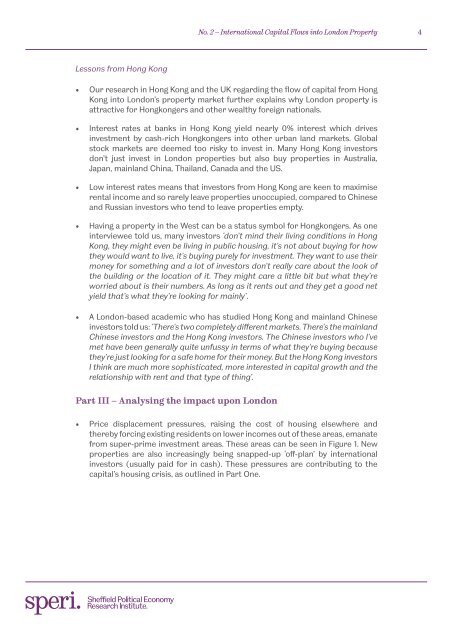International Capital Flows into London Property
Global-Brief-2-International-Capital-Flows-into-London-Property
Global-Brief-2-International-Capital-Flows-into-London-Property
You also want an ePaper? Increase the reach of your titles
YUMPU automatically turns print PDFs into web optimized ePapers that Google loves.
No. 2 – <strong>International</strong> <strong>Capital</strong> <strong>Flows</strong> <strong>into</strong> <strong>London</strong> <strong>Property</strong><br />
4<br />
Lessons from Hong Kong<br />
• Our research in Hong Kong and the UK regarding the flow of capital from Hong<br />
Kong <strong>into</strong> <strong>London</strong>’s property market further explains why <strong>London</strong> property is<br />
attractive for Hongkongers and other wealthy foreign nationals.<br />
• Interest rates at banks in Hong Kong yield nearly 0% interest which drives<br />
investment by cash-rich Hongkongers <strong>into</strong> other urban land markets. Global<br />
stock markets are deemed too risky to invest in. Many Hong Kong investors<br />
don’t just invest in <strong>London</strong> properties but also buy properties in Australia,<br />
Japan, mainland China, Thailand, Canada and the US.<br />
• Low interest rates means that investors from Hong Kong are keen to maximise<br />
rental income and so rarely leave properties unoccupied, compared to Chinese<br />
and Russian investors who tend to leave properties empty.<br />
• Having a property in the West can be a status symbol for Hongkongers. As one<br />
interviewee told us, many investors ‘don’t mind their living conditions in Hong<br />
Kong, they might even be living in public housing, it’s not about buying for how<br />
they would want to live, it’s buying purely for investment. They want to use their<br />
money for something and a lot of investors don’t really care about the look of<br />
the building or the location of it. They might care a little bit but what they’re<br />
worried about is their numbers. As long as it rents out and they get a good net<br />
yield that’s what they’re looking for mainly’.<br />
• A <strong>London</strong>-based academic who has studied Hong Kong and mainland Chinese<br />
investors told us: ‘There’s two completely different markets. There’s the mainland<br />
Chinese investors and the Hong Kong investors. The Chinese investors who I’ve<br />
met have been generally quite unfussy in terms of what they’re buying because<br />
they’re just looking for a safe home for their money. But the Hong Kong investors<br />
I think are much more sophisticated, more interested in capital growth and the<br />
relationship with rent and that type of thing’.<br />
Part III – Analysing the impact upon <strong>London</strong><br />
• Price displacement pressures, raising the cost of housing elsewhere and<br />
thereby forcing existing residents on lower incomes out of these areas, emanate<br />
from super-prime investment areas. These areas can be seen in Figure 1. New<br />
properties are also increasingly being snapped-up ‘off-plan’ by international<br />
investors (usually paid for in cash). These pressures are contributing to the<br />
capital’s housing crisis, as outlined in Part One.


